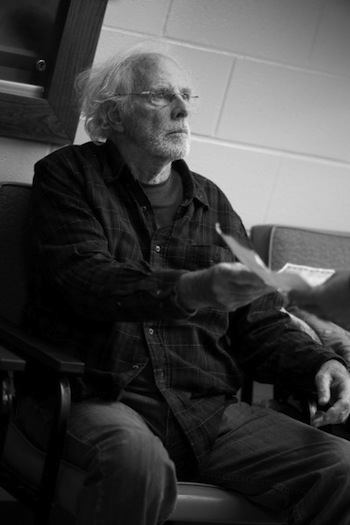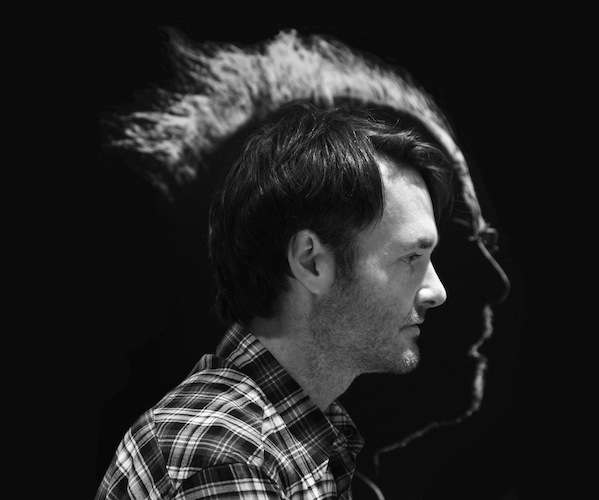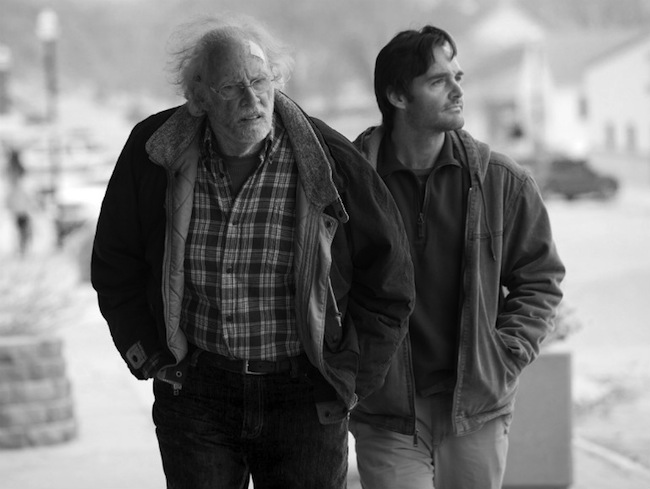Film Interview: Will Forte on Alexander Payne’s “Nebraska”
It was intimidating to go into a situation with a director (Alexander Payne) that you love so much and an actor (Bruce Dern) who has done so much and worked with so many amazing people.
By Rob Ribera
Director Alexander Payne’s Nebraska at first strikes the viewer as a simple film. (Now screening in cinemas around New England.) It follows a father and son as they make their way from Montana to Nebraska: Woody, the alcoholic, absent-minded, and aging patriarch is traveling to collect his million dollar prize from a publisher’s clearing house mailer. Indulging his father’s whim, his son is using the trip to establish some sort of a connection with him. The predictable confrontations ensue. Father and son quibble. Father orders son to “Be a Man.” Son encounters nearly a dozen duplicate versions of his father at a family gathering. They are all plain-and-soft-spoken Midwest folk. But they perk up when they find out that Woody’s come into money—or at least the promise of riches. Even though the sone knows that the trip is pointless, he attempts to protect his father. Nebraska eventually focuses on the relationship between the two men, and a simple narrative becomes a bit more complicated.
Will Forte, a writer and comedian known for his days on Saturday Night Live, plays the son, matching Bruce Dern’s sardonic and stubborn old man as they make their way to the heart of the country in search of more than just the promise of wealth, but for some small victory after decades of being pushed to the bottom. Forte gives a subtle and nuanced performance in the role.
I sat down with Forte for a roundtable interview with some fellow journalists. What follows is an edited and condensed version of that conversation.
Arts Fuse: Can you talk a little bit about your first reaction to Bob Nelson’s script and then the audition process?
Will Forte: I loved the script. It read to me as more of a drama than a comedy, so I was really surprised at all the comedic moments that Alexander found in the script. It made me go back to the script and wonder, ‘How did I not know this was really funny, this area right here.’ Anyway, the script was just wonderful and I felt a connection to the character of the son. So I thought, why not send in a tape of myself doing the scenes, feeling that I had no shot at realistically getting the role. But I just really loved the script so much I figured, what the heck, in the same way that you buy a lottery ticket, knowing that you have no chance of winning.
AF: When did you first hear about the reaction to the tape?
Forte: Probably somewhere in March I heard back from Payne, which is about four and a half months after I sent it to him. And that was really exciting, just to hear that he really liked the tape at all. That alone would have been a major thing in my career. Alexander Payne liked a tape I sent in. But I didn’t think it would go any further than that. I went in to read the scene in person, and it seemed to go fine. Fine, or even well. He said some very nice things afterwards, which surprised me because I didn’t know how I had done, and I felt nervous. Still, it was pretty close to how I felt like how I wanted to do the role if I had gotten the part, so I felt comfortable with my approach.
AF: How meaningful was it that you were chosen for the part over Bryan Cranston, Casey Affleck, and Paul Rudd?
Forte: Well, I have never heard any of that stuff, so…you know, I don’t know how I got this part. I am so appreciative of being given this opportunity. It’s a rare thing to get to do something like this and I did not expect it, and it made me really nervous. It was intimidating to go into a situation with a director that you love so much and an actor who has done so much and worked with so many amazing people. And they were both really good about making me feel comfortable and wanted. The best way to put it is that it was the best experience of my life.
AF: So was it more exciting to get the SNL call or the call for this?
Forte: It’s very interesting. They were very similar calls to get. SNL was the most exciting. They were both exciting, but because of the way my brain works I can’t savor the news for very long because fear sets in. In both cases I remember getting the jobs and wanting that period to never end between getting the job and the job starting. My brain gets nervous about stuff and goes to worst-case scenarios such as ‘Now I have to do this’ and ‘Don’t blow this.’ The difference is that I wanted to go into comedy, it was my ultimate goal, so the SNL job was terrifying to me because I began to think that I might suck at my dream. This job I would have never have put on my dream list. It just was not a possibility. It just wasn’t something I ever thought I’d get a chance to do, so it was every bit as intimidating, but it just came from out of nowhere. It’s an experience I know is a rare one for actors, especially for some shit head coming from comedy.
AF: You said that you had some connection to this role. Can you elaborate on that?
Forte: I was comfortable with the script. This character was way closer to how I am in my real life, so I was comfortable in that I kind of knew what I should have been doing. But it also makes the experience uncomfortable because you feel vulnerable in a way that you don’t feel when you’re performing characters, even if you’re doing things that are more embarrassing. You can always blame it on the character: ‘Oh, that’s not me, I’m wearing a mustache, that’s this character that’s wearing a mustache.’ If you have stupid little mustache on you feel like it’s not you But this role felt much closer to home and genuinely revealing. Terrifying in a way, but also it was thrilling, so once you got used to that aspect of it, it became fun. I was not terrified during all the filming process. Payne and the major cast members were very good about making me feel comfortable. The week before we started shooting we all got together. It was supposed to be a rehearsal period, but we didn’t really do any rehearsing. We hung out and got to know each other for the most part, and that was really wonderful because by the time we started working my fear of the unknown had become a much lesser fear. There was still a tiny bit of anxiety, but I could handle it.
AF: How does it feel to make a movie that reminds people of their family?
Forte: This movie brings up my own family, even though it is nothing like my own. The message of the film for me is one of hopefulness. If you have a difficult relationship with your family, relationships with family members that are not where you want them to be, there is still time to turn these problems around as long as those involved are still living. So go and make change happen because you never know when time will run out.
AF: Can you talk a little bit about Alexander Payne on set, how he directs the actors?
Forte: It’s so hard to describe the way he is. He is an incredibly confident person. He’s very smart and knows exactly what he wants, so he is very relaxed on the set. And everyone around him is relaxed because it starts with him. It’s just the most welcoming set, and that helps so much. He gets you to a point where the script is in such good shape that by the time you get at the set you know what he expects from you. A lot of times it’s just a matter of little adjustments here and there. He’s not going to finish up a scene until you know he’s happy with what he’s got. That’s a great feeling. That was something I had to learn, because at first I’d be insecure about the way I had done something and I’d be like, ‘Are you sure you got what you wanted,’ and he said, ‘I would not be moving on if I did not get what I wanted.’ And I thought, oh, he’s bullshitting me, he’s really unhappy with what I just did. And then after I got to know him and worked with him longer I realized he knows exactly what he wants and the way he talks to actors differs from scenario to scenario. Sometimes he’ll be very hands-on and detailed in his explanations. Sometimes there’d be almost no instruction, just a chat with you.
AF: What were some of the things he told you to do differently?
Forte: I don’t remember. Probably because I came from a sketch comedy background I was overly concerned about being too sketchy. Thus I probably tried to go too far the other way at first and underplay the role. And that’s what I did at my audition too, I gave a pretty straightforward reading. So I erred on the side of underplaying at times, and I remember Payne asking me to put a little more energy into my performance. Bruce Dern would give me advice all the time. Not about scenes, just about life, and work stuff. They were constantly guiding me; I got a feeling of security and comfort, as if I had guardian angels helping me along.
AF: Can you talk little bit more about working with Bruce Dern and June Squibb and Stacy Keach?
Forte: It was the best. We’ve already talked about how intimidating it was to become part of the film. Those three people have had such amazing careers and worked with so many amazing people it terrified me. And they were all so wonderful and sweet. And they’re such great actors. Bruce is nothing like the character he plays in this movie. He’s talkative and vibrant and tells these long stories about Alfred Hitchcock and Elia Kazan. I could talk to him forever. Then the cameras would turn on and he would just morph into the character you watch on the screen, which is a man of few words, gruff. And June was the same way, so different from the character she plays. She’s this very sweet woman. There are pieces of them, their real personalities, in their characters for sure. And Stacy, he’s the ultimate cool person. He’s just really mellow. He’s like what I picture a jazz man to be, just super cool.
AF: How did you relate to the character?
Forte: I guess the most important personal relationship that helped me connect with my character was my relationship with my grandpa. It’s really nothing like the relationship between me and Bruce Dern in this movie, but at the same time it’s identical. It’s hard to explain. He was a man of very few words and I got to spend nineteen years with him and sometimes you would become really frustrated with him because of his lack of communication. But he was wonderful, and I loved him. He was a character, priceless. But that relationship made sense to me. I don’t know how these characters feel so familiar to me, but they do.
AF: What was your favorite part of filming this movie?
Forte: Well, I’ll tell you, I got to spend a lot of time with Bruce Dern during this. We got to be very close. We spent a lot of time together, and I got to watch him create this performance, and that was really cool to be a part of. Towards the end of the film our characters grow much closer and that’s kind of what happened in our personal life as well.
Rob Ribera is a filmmaker and music video director in Boston. He is the co-creator of the music website Sleepovershows.com, and is currently working on his PhD.in American Studies at Boston University.




[…] my real life, so I was comfortable in that I kind of knew what I should have been doing,” Forte said when Nebraska opened. “But it also makes the experience uncomfortable because you feel vulnerable […]